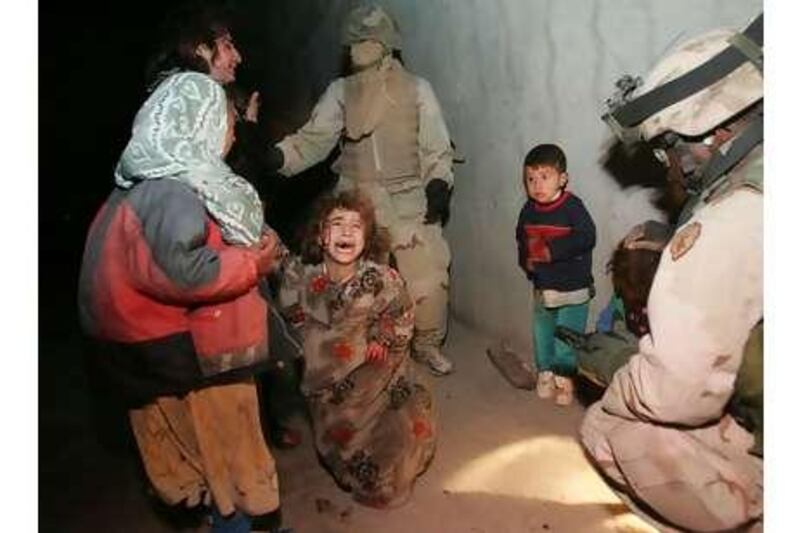BAGHDAD // Iraqis have reacted with disbelief and anger after their country agreed to pay hundreds of millions of dollars in compensation to American victims of Saddam Hussein. The package, worth $400 million (Dh1.5 billion), will settle outstanding claims by US citizens who were caught up in the Iraq's invasion of Kuwait two decades ago. Hundreds of Americans were held as human shields by the former leader during the run-up to the 1991 Gulf War, with many saying they were tortured and subjected to psychological trauma. They have since sued the Iraqi government for financial damages.
Ordinary Iraqis were shocked by the news their government would make the payout, at a time when thousands of people are struggling with crippling poverty and the disastrous humanitarian fallout from the US-led invasion. Umm Samer, a mother of one from New Baghdad, a suburb of the city, burst into tears when she heard about the deal. Her 14-year-old son lost a leg when a US military vehicle accidentally ran over him five years ago.
The family failed to get financial compensation from the US authorities, or aid from the Iraqi government, to help meet medical bills. "It's impossible to imagine that our government will pay the Americans when our own people are still suffering from what the Americans have done here," she said. "For years I've watched my son in his pain; he still has health and psychological problems from having his leg amputated, but we've had no help from anyone."
Along with other Iraqis, Umm Samer said the compensation payment would only be acceptable to them if they, like their US counterparts, were now allowed to sue the US government for damages. "The Americans have fought for their citizens' rights against Saddam Hussein, now let our government ask for our rights," she said. Another resident of New Baghdad, Ali Abdel Majeed, reacted with similar outrage over the compensation. His car was crushed when a US tank reversed over it in a skirmish with militants in 2006.
"I risked my life working with the interior ministry to save the money for that car," he said. "I wanted to go into business with it, but after the tank ran over it, there was nothing left. That cost me two years of my life. "I'm furious that we are paying the Americans, especially for things that Saddam did. It doesn't make sense." The US military did have a so-called "consequence management" system for quick compensation of damages, but payments were hard to access and the sums were paltry. A dead family member, killed accidentally by US forces, would result in a cash handout of $2,500, the maximum amount allowed for each claim. A blown-up house might merit $1,300, a damaged door $50.
Iraq's authorities have been reticent on the compensation settlement. The foreign ministry did issue a statement on its website confirming an agreement had been signed. It said the deal was aimed at helping to remove United Nations "Chapter 7" provisions currently imposed on Iraq, which include crippling sanctions levied against the former regime. Since 1994, Iraq has paid $30.15bn in reparations to Kuwait, with an additional $22.3bn still outstanding.
Baghdad is required to put five per cent of its oil and gas revenues into the fund until all dues have been met, money it can ill afford given national budget deficits and overwhelming domestic needs. Iraqi finance officials said paying the US compensation made fiscal sense, and would help to prevent Iraqi overseas assets from being frozen in banks. "By paying this money we are protecting Iraqi money," said Mudher Mohammad Saleh, counsel to the governor of Iraq's central bank. "If we didn't make this payment and settle this case, the US would freeze our money under Chapter 7 provisions."
Despite that reasoning, the payout remains highly controversial, particularly at a time when people's opinion of the government and of politicians has plunged to new lows. Elections were held more than six months ago and a new coalition administration has yet to be formed. While political factions horse-trade over the division of power, security has begun to fray dangerously. The suggestion that US citizens were getting compensated for the psychological traumas inflicted on them by Saddam Hussein brought a sharp response from Abu Ghassan, a resident of Kut, 160km south-east of Baghdad.
His wife had a heart attack when US forces mistakenly staged a dawn raid on their house, instead of the property next door, while trying to arrest a suspected militant more than two years ago. "My family was terrified, my son still has nightmares about that and my wife has never recovered her health," he said. "The soldiers said sorry to us, but words don't pay medical bills. "I'm angry that the Iraqi government is paying Americans when they should be paying us."
In Baghdad, Ammer Zubaidi, a renowned Iraqi psychotherapist helping patients cope with the mental traumas of war, said he understood the US government's position in pushing for compensation. "They have done what all governments must do for their people," he said. "I now want to see our government do the same. If the Americans have hundreds of people with suffering trauma because of Iraq, Iraq has tens of thousands suffering because of America.
"I've got more patients than I can cope with, many of them are children who really need help and who are not getting it. I suggest our government draws up an invoice for all of this damage and sends it to Washington." @Email:nlatif@thenational.ae psands@thenational.ae Phil Sands reported from Damascus





